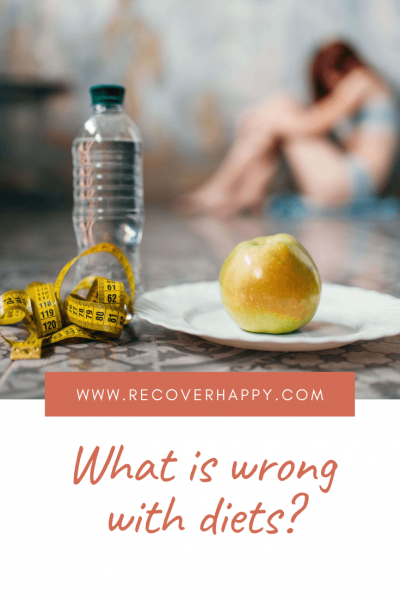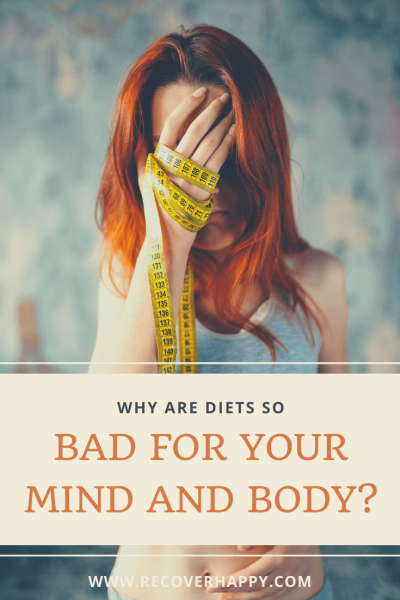Why are diets so bad for your mind and body?
By Tanja, Psychologist for Eating Disorders & Body Image

If diet culture were a movie, what kind of movie would it be? Would it have a happy ending, in which the heroes have reached their target weight with the help of diets and experience constant body love and acceptance?

Hi there!
I’m Tanja. I’m a qualified psychologist specialising in eating disorders, negative body image and body hate. I’m also a survivor of anorexia.
My mission is to help you to end your lifelong struggles with food and your body and inspire you to uncover and embrace you true worth. Read more…
Or would it have a more dramatic ending, whereby a desperate and sad protagonist is sitting in a hospital due to a severe eating disorder, caused by non-stop dieting? The latter would probably be the more likely scenario.
I know it’s a pretty sad and dramatic ending, but that is exactly what diet culture leads to – diet culture is a mean thing that destroys people’s life by making them unhappy, desperate and disgusted by their bodies. Worst of all, it can even cause eating disorders such as anorexia, bulimia, binge eating disorder or orthorexia.
This diet culture causes the critical voice in your head blaming your food choices, labelling them as “good” and “bad” and judging your appearance all the time. It also determines the often ridiculous food guidelines that you impose on yourself. Furthermore, as a normal human being, you just want your body to fit in to society so that you risk losing yourself in the process. You are willing to trade your authentic self, even if it feels wrong, for the chance to be socially accepted. You diet because everyone around you seems to be doing it and it is what you know and it feels as thought it is expected in our society.
Join the Body Acceptance & Food Freedom Collective
Receive a weekly dose of inspirations to help you make peace with your body and food.
Don’t worry, we hate spam too. You can unsubscribe any time.
The side effects of the diet culture
Categories
Anorexia
Binge Eating Disorder
Bulimia
Intuitive Eating
Mindfulness
Orthorexia
Strategies for Recovery
Many millions of people are on a diet most of the time. However, the truth is that dieting rarely works: only 5% of dieters manage to lose some weight over the longer term. However, the other 95% are much less successful; many experience temporary weight loss but end up regaining their lost weight (and often more) within 1 to 5 years. This leaves many dieters feeling even worse than they did before starting their diet.
Furthermore, almost all dieters report some psychological or physical side effects. Those who do manage to lose weight risk developing eating disorders or restrictive eating styles.
But why is the diet culture still so popular even though most people know that they don’t work? Because diets work in the short run, which is good enough for many. At the start of a diet, people usually see a quick transformation and may also feel better about themselves and their bodies, which makes them think that their diet works. However, they experience a yo-yo effect, whereby they go through cycles of weight loss and gain. And deep down, most people know that dieting provides results that are temporary, unsustainable and unsatisfying.
While many dieters know that diets rarely work, what many do not necessarily know is that dieting may be hurting their body and mental health. So what are the side effects of a diet?
Physiological effects of dieting
- “Yo-Yo” dieting is more likely to produce cortisol (stress hormone), which promotes weight gain and has been linked to a higher risk of heart disease, high blood pressure, Type 2 diabetes, cancer and premature death.
- Skipped or irregular menstrual cycles.
- Fertility problems caused by hormonal disruptions and regularly eating less than your body needs.
- Increased risk of nutrition-related problems such as decreased bone mineral density, increased sensitivity to high-fibre foods or deficiency in essential minerals, vitamins or other nutrients.
- Loss of hunger and fullness cues due to restrictive eating patterns.
- Feelings of weakness and exhaustion.

Psychological effects of dieting
- Study findings suggest that the younger someone starts dieting, the more likely they are as adults to be obese and drawn to self-harming behaviours such as alcohol misuse and self-induced vomiting.
- Increased self-criticism and shame.
- Increased stress, triggering binge eating and food cravings.
- Chronic dieting can cause feelings of depression and low self-esteem.
- Loneliness, due to social isolation and disengaging from activities and interactions.
- Fixating on what you can eat and can’t eat.
- Anxiety and worries around decisions related to food.
- Increased risk of developing eating disorders or unhealthy eating patterns due to the constant concern about body weight and shape and calories, which can start a vicious cycle of body dissatisfaction and obsession.
- Lack of energy, which can, in turn, restrict brainpower and cause slower reaction times and lower concentration levels.
To develop a positive relationship with food and your body, you have to reject the thought that dieting is the only way to fit into society. You need to become aware that a destructive “diet voice” is preventing you from leading the life you want to live.
So next time you feel the desire to diet, take a moment and think about the reasons why you want to lose weight. Are these reasons really worthwhile? Then think about the potential harm that dieting can do to your body and mind. And remember: you are worth so much more than your weight or your clothing size.
You don’t need to struggle alone on your recovery journey. Simply get in touch to discuss how I can help you.
It is entirely possible to overcome an eating disorder or body hate – I have done it, others have done it and so can you!
Join the Body Acceptance & Food Freedom Collective
Receive a weekly dose of inspirations to help you make peace with your body and food.
Don’t worry, we hate spam too. You can unsubscribe any time.
You Might Also Enjoy...

Hi there!
I’m Tanja. I’m a qualified psychologist specialising in eating disorders, negative body image and body hate. I’m also a survivor of anorexia.
My mission is to help you to end your lifelong struggles with food and your body and inspire you to uncover and embrace you true worth. Read more…




